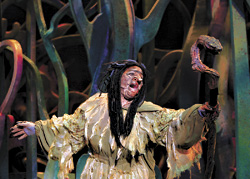The least of Stephen Sondheim’s masterpieces, Into the Woods is also the most fascinating, lit by infernal shadows that deepen its big-time showbiz flash and dazzle. A high-speed collision of the fairy tales Jack and the Beanstalk, Cinderella, Little Red Ridinghood, and Rapunzel—plus a Grimm pastiche about a barren baker and his wife who crave a baby—Woods is a bewildering maze and a mess. That’s despite librettist James Lapine’s mad clockwork plot logic, the close-order drill of Sondheim’s daredevil rhymes, and melodies like Scorpion tequila with a bite of lime.
This may be the only hit musical with roots in Dachau. It’s inspired by the far-fetched fairy-tale analyses of Holocaust escapee Bruno Bettelheim’s 1976 book, The Uses of Enchantment. A fraud who falsely claimed that other fraud, Freud, anointed him, Bettelheim utterly suckered highbrow Americans for half a century. He wrote an influential book accusing his fellow Dachau prisoners of behaving like passive children who emulated Nazis and fought each other, and won fame by claiming to cure most of the autistics at his experimental school in Chicago.
Sondheim can only quarry songs from a stimulating story line, and Bettelheim made fairy tales interesting again. With pitiless wit, Sondheim and Lapine wove the tales into scary, funny new shapes, fugues of fucked-up behavior. The Witch (Lisa Estridge, a good singer and better rapper) is convinced she’s a wonderful mother to dim bulb Rapunzel (angelically sweet-voiced Anne Eisendrath), even though in fact she stole the girl from her real mother and imprisoned her in a tower. (Shades of Bettelheim’s school, known as “Bruno’s Castle.”) Ridinghood (10-year-old prodigy Ireland Woods) is a brassy brat with a knife who’s as big an overeater as the Wolf, though this show tones down the carnality because she’s so young.
In the long, strong first act, everybody’s wishes get fulfilled. Sondheim has notorious trouble with second acts, and this one goes completely nuts. If Tom Stoppard can overpopulate and overcomplicate a play, Sondheim insanely outdoes him here. But his glee in turning everyone’s dreams to nightmares is bracing, and often funny. Billie Wildrick’s marvelously sung Cinderella flees her Prince, who cheats on her with the Baker’s Wife (the wonderful Leslie Law). Cinderella’s Prince (Michael Hunsaker) and Rapunzel’s Prince (Logan Benedict) hilariously prance, preen, and self-pityingly sing of their agony in lusting after Sleeping Beauty and Snow White instead. A prince who’s charming, not sincere—it’s a good joke that turns fairy tale into reality TV.
Like Bettelheim’s (possibly fictitious) squabbling Dachau detainees, the denizens of Sondheim’s woods blame each other instead of teaming up against the Giant who threatens them all with death. Characters get bloodily blinded, mutilated, and humiliated—sounds like Sondheim’s childhood!
But these songs are not his best. The title tune is trudgingly monotonous, and most of the aesthetic high points involve incredibly clever verbal music. Cinderella’s bravura “On the Steps of the Palace,” which Wildrick knocks out of the park, is our era’s answer to Gilbert and Sullivan’s patter songs—but you don’t walk out whistling it. Again and again, promising tunes loft without soaring, like kites on a heartbreakingly unblustery day. The one exception is the penultimate song, “No One Is Alone,” which isn’t just good, it’s effing ineffable.
And it exemplifies the play’s imprisoning paradox. Everybody goes into the woods and learns life’s bitter limits, like a good analysand submitting to a Viennese tyrant. Broadway tradition wants such lessons to lift the human spirit, especially in the finale. “No One Is Alone,” whose haunting, whistlable melody oddly echoes Sammy Davis’ “The Candy Man,” presents itself as a reassuring, up-with-people message, but Sondheim subverts it. The song kind of says we are alone, responsible for our fate.
Both Sondheim and Bettelheim were abandoned by their dads and found alternate father figures. Sondheim’s was Oscar Hammerstein II, whose “You’ll Never Walk Alone” gave Carousel its rousing finale. Maybe “No One Is Alone” is an Oedipal stab at outdoing Oscar, but it’s just a flesh wound. Sondheim only wins big when he goes for the nihilist gore (Sweeney Todd will be HUGE). Into the Woods is a muddled half-measure.
And for God’s sake, don’t miss it! I enjoyed this revival more than the 1987 Broadway version. The performers are in fine form (though Ireland Woods needs a few more elocution lessons and Estridge sings a few notes flat). The set’s woods look like a giant child’s crayon drawing of an Alfons Mucha motif, but it’s all quite colorful, and the costumes are more so. I haven’t had so much fun at the 5th since Hairspray. It’s a weird kind of fun, riskily balanced over an abyss. Fairy tales were never fractured in such thought-provoking ways.








